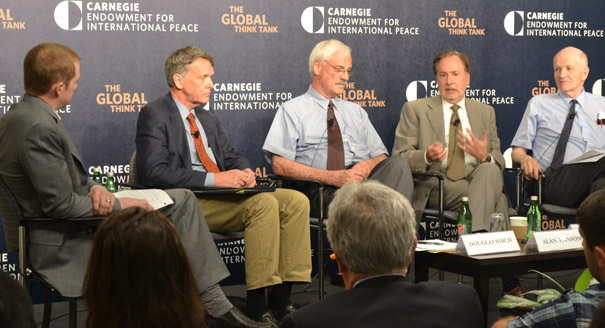Registration
You will receive an email confirming your registration.
The single most costly U.S. nonproliferation program currently underway faces a cloudy future in Washington. The Obama administration has proposed to halve planned spending for a U.S. plutonium disposition program that was crafted in negotiations with Russia and has been blessed by three U.S. presidents.
The U.S. Department of Energy has begun studying alternatives, creating uncertainty about the future of a $7.7 billion nuclear fuel factory in South Carolina that lies at the U.S. end of the bargain. Lawmakers who wish to keep the project alive held up Ernest Moniz’s confirmation as energy secretary for a month and have threatened to block other nominations unless it proceeds.
The Carnegie Endowment’s Nuclear Policy Program will convene a special briefing and discussion on this controversial effort to reduce plutonium stockpiles. Panelists will discuss the program’s objectives and its difficulties, as well as options for minimizing plutonium that are now being explored. Speakers include Douglas Birch and R. Jeffrey Smith from the Center for Public Integrity, who have recently published four articles on this topic, Frank von Hippel of Princeton University, and Alan Hanson of the Massachusetts Institute of Technology.
R. Jeffrey Smith
R. Jeffrey Smith is the managing editor for the national security section at The Center for Public Integrity. Smith worked for 25 years in a series of key reporting and editorial roles at The Washington Post. In 2006, he won the Pulitzer Prize for Investigative Reporting, along with two colleagues at the Post, for articles on House Majority Leader Tom DeLay and lobbyist Jack Abramoff. Smith wrote about defense, intelligence and foreign policy matters and arms proliferation, among other topics.
Douglas Birch
Douglas Birch is a writer for national security section at the Center for Public Integrity. Birch is a veteran foreign correspondent and has reported from more than 20 countries. He formerly served as the Moscow bureau chief for the Associated Press and spent 22 years at the Baltimore Sun. Birch was the Associated Press’s diplomatic and military editor in Washington, following his work in Moscow from 2001 to 2005 and from 2007 to 2010. At the Baltimore Sun, he was an enterprise, feature and science writer.
Frank von Hippel
Frank von Hippel is a professor of public and international affairs at the Woodrow Wilson School at Princeton University. Von Hippel was formerly the assistant director for national security in the White House Office of Science and Technology. Prior to coming to Princeton, he worked for ten years in the field of elementary-particle theoretical physics. His areas of policy research include nuclear arms control and nonproliferation, energy, and checks and balances in policymaking for technology.
Alan Hanson
Alan Hanson is the executive director of the International Nuclear Leadership Education Program at Massachusetts Institute of Technology. He previously served as executive vice president of Technologies and Used Fuel Management at AREVA NC Inc. Hanson has more than thirty years of broad managerial, international, and engineering experience in the nuclear industry, most of which has been devoted to the back end of the nuclear fuel cycle, nuclear waste management, and issues of nonproliferation.
